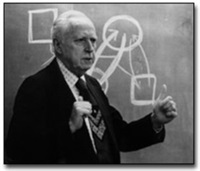EP85 Workshop 28 - On Eclecticism - Murray Bowen, MD
- Average Rating:
- Not yet rated
- Topic Areas:
- Workshops | Psychotherapy | Therapist Development
- Categories:
- Evolution of Psychotherapy | Evolution of Psychotherapy 1985 | Pioneers in Couples and Family Therapy
- Faculty:
- Murray Bowen, MD
- Duration:
- 2 Hours 27 Minutes
- Format:
- Audio Only
- Original Program Date:
- Dec 15, 1985
- License:
- Never Expires.
Description
Description: A comprehensive examination of psychotherapy, human behavior, and family dynamics, exploring the evolution of therapeutic approaches, the challenges of understanding human cognition, and the critical role of personal growth in mental health. This work delves into the concept of differentiation of self, the foundations of psychoanalytic theory, and the complex interactions between individual development, societal influences, and family systems.
Syllabus Description: Presented will be a teaching tape on the values and perils of therapist-oriented (undifferentiated) eclecticism. The therapist, whether he likes it or not, is a model for the family. An unsure therapist is a poor model when a well defined family is a goal.
Educational Objectives:
- To know when eclecticism fits the therapist
- To understand how feeling-oriented eclecticism is detrimental to the model
*Sessions may be edited for content and to preserve confidentiality*
Credits
Faculty

Murray Bowen, MD Related Seminars and Products
Murray Bowen (31 January 1913 in Waverly, Tennessee – 9 October 1990) was an American psychiatrist and a professor in psychiatry at the Georgetown University. Bowen was among the pioneers of family therapy and founders of systemic therapy. Beginning in the 1950s, he developed a systems theory of the family. From 1954 to 1959, Bowen worked in the National Institute of Mental Health, Bethesda, Maryland, where he continued to develop the theory that would be named after him: Bowen Theory.[4] At that time, family therapy was still only a by-product of theory. Bowen did his initial research on parents who lived with one adult schizophrenic child, which he thought could provide a paradigm for all children. After defining the field of family therapy he started integrating concepts with the new theory. He claimed that none of this had previously been described in the psychological literature. What began the first year became known nationally in about two years.
From 1959 to 1990 he worked at the Georgetown University Medical Center in Washington DC as clinical professor at the department of Psychiatry, and later as director of Family Programs and founder of a Family Center.


